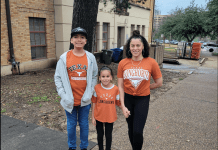
I knew the branch was dead. I had been eyeing it after every storm to see if it had fallen yet. What I didn’t know was that my daughter could reach it. I sent her out to play in the backyard, which is clearly visible from any of the windows in the dining and living rooms. She came back within 10 minutes, rubbing the top of her head and told us that she had pulled the branch down on herself.
Kids do the craziest things. But still, that Mom guilt set in quiiiiick, I tell ya. Why didn’t I know she could reach that branch? I should have call the tree trimmers earlier! Why didn’t I see her tugging on it?
My husband and I checked her head; there were no abrasions. We kept an eye on her; she was a little woozy for 10-15 minutes but then began proclaiming she felt better. We gave her an ice pack and called it a close call. Still, she woke the following morning with a headache. A quick call to the pediatrician revealed that she did, indeed, have a mild concussion. I took her in to be examined as a precaution and received the never ending list of activities she could not participate in until she had been symptom free for a full 24 hours.
Here I am, half way through my eighth year of parenting, and although the brain is the most important, complex part of the body, I’d never educated myself on head injuries.
Here’s what I learned, and I hope that sharing what I had to quickly learn due to my ignorance will lead to quicker action on the part of any who need this information. Please remember that I am not a healthcare professional and if there is ever a question regarding your child’s health, call your pediatrician. For instance, call if your child suffers from anything more than a light bump on the head. Signs of a serious injury include, but are not limited to, headaches, dizziness, vomiting, confusion, blurred vision, sensitivity to light, seeing stars, ringing in the ears. Call your doctor if a headache lasts more than 24 hours or if they won’t awaken easily.

Our pediatrician instructed us that until she was symptom free for 24 hours, she could not do any of the following:
- read
- have screen time
- write
- run
- jump
- cartwheel
- play any sports
- study
- concentrate
OK, so, it might have been easier to list the things she COULD do with a concussion:
- listen to audio books
- cook
- draw
- short, non-strenuous walks
- sleep
- have a friend come for a short visit
I hope you never have to use this information; but should an emergency arise in your future, I hope you are prepared to tackle it head on. (corny pun intended 😉 )
*This not meant to be a substitute for medical advice, diagnosis or treatment. Always consult your healthcare professional with any question regarding any medical condition.









